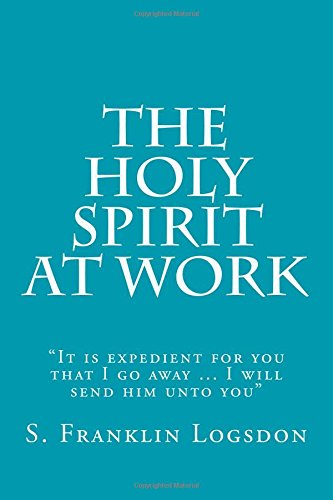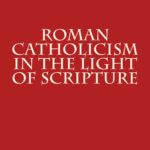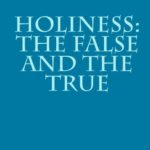Description
THE HOLY SPIRIT AT WORK
by
S. Franklin Logsdon
“It is expedient for you that I go away . . . I will send him unto you“
CHAPTER ONE THE SPIRIT CAME TO MEN. 5
CHAPTER TWO THE SPIRIT GLORIFIES THE SON. 14
CHAPTER THREE THE SPIRIT BAPTIZES INTO CHRIST. 22
CHAPTER FOUR THE SPIRIT INDWELLS THE SAINT. 30
CHAPTER FIVE THE SPIRIT WORKS IN PEOPLE. 36
CHAPTER SIX THE SPIRIT GUIDES THE BELIEVER. 41
CHAPTER SEVEN THE SPIRIT GIVES ASSURANCE. 47
CHAPTER EIGHT THE SPIRIT PROVIDES POWER. 52
CHAPTER NINE SPIRIT FLOWS THROUGH HEARTS. 60
CHAPTER TEN THE SPIRIT OPERATES IN PRAYER. 67
CHAPTER ELEVEN THE SPIRIT WALKS WITH CHRISTIANS. 73
CHAPTER TWELVE THE SPIRIT CONVINCES OF SIN. 81
CHAPTER THIRTEEN THE SPIRIT ENLARGES VISION. 86
CHAPTER FOURTEEN THE SPIRIT KNOWS THE FUTURE. 95
CHAPTER FIFTEEN THE SPIRIT POSES A QUESTION. 104
CHAPTER SIXTEEN THE SPIRIT AND THE ONE BAPTISM.. 112
PREFACE
THE HOLY SPIRIT is the Administrator of the divine economy:
– We deal with Him, else we are out of touch with Heaven.
– We yield to His gracious promptings, or we submerge ourselves in the futility of self-will.
– We receive of His strength, or we remain impotent.
Our eyes will be unopened; our minds unenlightened; our hearts unaffected; our feet not led.
The Holy Spirit is not only the Administrator of the divine economy, He is also the Author of divine Revelation.
– He employed human instrumentality, but the Bible is His production.
– Holy men of old were borne along by His power and direction (II Peter 1:21).
– He wove the element of life into its lines as the wool is woven into the fabric (I Peter 1:23).
– He infused into its texture the manna of Heaven to nourish the life it produces (Job 23:12; II Peter 1:3).
– He electrified its content with hallowed illumination capable of dissipating the densest darkness along our wilderness pathway (Psalm 119:105).
– He incorporated a power within its message to bulwark the believer against the militating forces of evil.
– He built into its structure a potent provision capable of dismantling the strongholds of Satan.
The Holy Spirit is the Lord of the harvest. He controls the workers in the field, which is the world, by empowering, directing and prospering.
– Where there is a lack of acquaintanceship with Him, there will be proportionately a lack of service for Him.
– Where there is a lack of service, there will be a lack of reward.
Meanwhile, the work which He designed will be unaccomplished. Then declension ensues—spiritual darkness sets in; saints weaken; the church limps and lags; and the unconverted plunge unchecked toward disillusionment and doom.
The Holy Spirit has power to regenerate, providing a new nature;
– To sanctify, producing a new character;
– To energize, promoting a new fruitfulness;
– To illuminate, presenting a new vision.
Yet, to the multitudes, this member of the Godhead is no more than a fantasy or a mere influence. We tremble at the consequences of inattention, indeed willful rejection, exhibited so prevailingly with regard to His presence and purpose. This can only invite sorrow, defeat and eternal loss.
The considerations of the Spirit’s ministry in this volume, although not exhaustive, cover a wide area of important, practical truth.
May His tender entreaties and gracious promptings find in each of us a perceptible yieldedness, indeed a full surrender to His control!
– S. F. L.
CHAPTER ONE THE SPIRIT CAME TO MEN
“Suddenly there came a sound from heaven as of a rushing mighty wind”
THE ACCOUNT of the Holy Spirit’s descent is not a newsman’s report. The diction is distinctly and decidedly in keeping with the uniqueness of the event. When God wrote about His physical creation, He presented it in a mere paragraph. When He related the joyful account of His Son’s incarnation, He simply stated, “Now the birth of Jesus was on this wise.” Concerning the coming of the Comforter, the statements are noticeably few yet amazingly expressive. There is reference to sound, suddenness and supernatural signs. Then, when He was manifested, He ministered. The age of the Spirit had opened.
NEW PHASE OF DIVINE OPERATION
Crowds were common sights in Jerusalem on feast days. Many other features were ordinary about this particular day, but the fire and wind were phenomenal. They marked the dawn of a new era. As the old order changes, God fulfills Himself in many ways; but Pentecost was singular in its display of the unusual. There will be no other.
Bethlehem witnessed the humbling and Jerusalem the humiliation of Deity. The manger was inglorious and the cross ignominious, but from the empty tomb to the final triumph, omnipotence no longer will be concealed in the motions and movements of God. All divine manifestations must be mighty forevermore.
– If there is fire, it will be striking in its appearance.
– If there is wind attending His operations, it will differ in its current.
– If there is power, it will defy description.
– If there are divine announcements, they will stagger the intellect.
This was Pentecost.
It was not a celestial enactment with a terrestrial setting. It was statedly a new phase of an infinite plan launched supernaturally at a scheduled time. It swept men along with its irresistible force. Human faculties were energized in a miraculous manner. Hearts were overwhelmed in an atmosphere unknown before. The wood of the manger may have mocked the Son made flesh, but the timbers of the house trembled when the Spirit was revealed. It was the debut of Deity.
The Manifestation of Power
The coming of the Holy Spirit was more dynamic than dramatic. His advent was designed, not to be picturesque, but potent. The Lord Jesus inferred this in His post-resurrection meeting with the apostles. He promised that the Spirit’s appearing would be accompanied by exceptional power. They could not escape the point that this power would be both evident and experiential.
“Ye shall receive power after that the Holy Ghost is come upon you,” they were informed (Acts 1:8).
Then they would understand why Jesus had told them not to let their hearts be troubled by virtue of His own departure (John 14:1).
– They would no more become drowsy and slumber-laden in a crucial hour (Mark 14:40).
– They would never again flinch and falter and fall before an accuser (Matthew 26:72).
– They would never again have sealed eyes concerning the unfolding plan and purpose of God (Luke 18:34).
– They would have power—enlightening, sustaining, directing, triumphing.
They would have the Holy Spirit in them.
Diverse Reactions
There were two distinct reactions on the part of the people in Jerusalem that day concerning the Spirit’s advent.
Some marveled; others mocked.
One group said, “What meaneth this?” The other, “These men are full of new wine” (Acts 2:12, 13).
The former were interested; the latter, critical.
The reader will observe three salutations in Peter’s address.
In the first, He answers the critical (Acts 2:14).
In the second, he reasons with the interested (Acts 2:22).
In the third (Acts 2:36), he registers his challenge with “all the house of Israel“—a message of paramount importance to all regardless of their attitude.
He speaks to the critical first, saying: “Hearken to my words . . . [It was not necessary to ask for a hearing of the interested.] This is that which was spoken by the prophet Joel” (Acts 2:14,16).
Of all parts of speech, the demonstrative is the most specific. It pinpoints the object in view. It is the index finger of grammar. The word “this” in the text points either to the fulfillment of Joel’s prophecy or simply a reference to it. Note well, the quoted prophecy has to do with wonders in the heavens (Acts 2:19). The matter at hand was a development on earth. Since the sun did not turn to darkness or the moon to blood, this was not a fulfillment (or even a partial fulfillment) of what Joel predicted.
The word “this” simply directed the critics to an Old Testament reference to Scriptures they were expected to revere.
More freely, Peter was saying: “But if you think these developments incredible, then listen to this which I am about to quote which was spoken to the prophet Joel.” Then the quotation follows. The inference is, “Was Joel drunk with wine? And, further, if God can at some time show wonders in the sky, can He not now show wonders on the earth?”
Having disposed of the critics, Peter turns to the interested.
His explanation begins at verse 23. The climactic point of his address is reached in verse 36 where he labors the fact that “all the house of Israel” (the critics and the concerned alike) must know that Jesus, who, though crucified, was and is both Lord and Christ. Then the Holy Spirit began to pierce them through with conviction (v. 37).
The Final Instructions
Although our Lord’s resurrection victory credentials had been presented in “many infallible proofs,” selfish ideas coupled with imperfect knowledge caused the apostles to jump at conclusions, even wrong conclusions, as they began to revel in an impression.
The earthly kingdom forged to the fore in their minds (Acts 1:7).
They visualized the Sovereign and the subjects.
They envisioned privilege and prosperity.
What they must visualize is the Saviour and sinners.
What they must envision is an offensive and an opposition—but obedience, hardship but happiness, warfare but willingness, viciousness but victory.
Before His ascension, Jesus set the stage for the next development in the divine economy. The final instructions were summed up solemnly in these words: “Ye shall be witnesses unto me . . . unto the uttermost part of the earth” (Acts 1:8).
All questions ceased.
National interests gave way to global concern. A new, vital outlook settled upon them. Then the pierced feet of the Saviour left the dusty surface of His footstool. The clouds folded their fluffy arms about the ascending High Priest who sat down at the right hand of God, there to witness the preparation, progress and productiveness of the commissioned devotees.
The Commission Concept
Those who were waiting faithfully, those who were prayerfully expectant were all in one accord. This means more than freedom from disputation. How could people pray together for ten days if they were in verbal conflict? But does it simply mean that they were free of disunity? That harmony reigned? It is more significant than this. People who pray together are welded together. Not only were they in accord with one another, they were all in accord with the commission which they had received from the Lord. They were ready to witness when the enduement of power was received. Were this not true, why did they tarry for the power to do so?
The great difficulty today is that people who claim to be followers of Christ are not in accord with His commission. He wants witnesses. Witnesses need power. Power comes from and through the Holy Spirit. This power is only entrusted to those who are dedicated to witness for the Lord. Never forget, this commission is still in vogue. We are to witness to the resurrected Christ. Because He lives, our faith is valid and our preaching profitable.
The Appointed Place
These dedicated, obedient, praying people were not only in one accord, but they were in one place.
There is only one place for a true servant of the Most High. It is the place of His appointment. It almost staggers the imagination to think of what would be the outcome if every Christian were to occupy the place of the Lord’s assignment.
– What a mighty impact would be made upon this dying world!
– What a stunning blow could be registered against Satan and his dominion!
– The church could rise from its pathetic defeat and put him to flight.
But what are the facts? Simply these:
– Posts are not being manned.
– Positions are not being filled.
– Christians are powerless, careless, listless, complacent.
Many are neither in accord with the commission of the Lord, nor in the place of His appointment. Internal deterioration more than any other factor has hindered the ministry of the church and sabotaged the work of the Spirit.
The Great Day of Promise
Then came the day of Pentecost. It is juvenile to think the Spirit might have come sooner if the people had prayed more enthusiastically. It is just as immature to believe that their praying brought Him. Divine plans are inexorable. They know no fluctuations. Yes, the day had come. For the Jews, who were gathered together in Jerusalem from many countries, it marked the feast of harvest. It was also the anniversary of the giving of the Law on Mount Sinai.
All divine movements are characterized by supernaturalness.
– This was true on the Mount of Transfiguration,
– This was true at the manger in Bethlehem,
– This was true in the manifestation of the Spirit’s coming.
An unusual sound reached their ears; a unique sight met their eyes.
– The sound was supernal because it was “from heaven.”
– The sound was sudden because it was “as of a rushing mighty wind.”
– The sound was surprising because “it filled the house.”
God was present with power. The promise of Christ was being fulfilled. The Son sat down with the Father in Heaven. Now the Spirit sits on men on earth. Now the commission can begin. And how choice are the figures employed— tongues, fire!
The fundamental function of the tongue of a Christian is fourfold:
- To sing forth God’s praise
- To sound forth His love
- To supplicate His throne
- To send out His Gospel
The Vanguard of a New Message
The Holy Spirit loses no time when He has a prepared people. He loosed their tongues, lifted their voices, and led them forth. But the fire was necessary too. The tongues and fire combine to illustrate the completeness of equipment for those who witness to the glory and grace of God. The suggestiveness in the figures is most extensive—too much so for many of the enlightening details in this writing. But as witnesses they were to possess a zeal and to constitute a light.
“Ye are the light of the world,” Jesus said. Now that light was to shine, even unto the darkened uttermost part of the earth.
As a matter of fact, what took place on the Day of Pentecost was, in miniature, a preview of the over-all picture of the church witnessing for Christ to the ends of the earth, to the end of the age, telling forth His Word and presenting His claims in all the languages of men.
In this connection, it must be clearly noted that they spoke in “other tongues” and not in unknown tongues—that is, tongues other than their own. Why? The text plainly states that the people in Jerusalem on that particular day were from “every nation under heaven.” How could these apostles talk to people who did not understand their language?
One of two things had to take place if a witness were to be borne. Either the foreigners would have to understand the language of the witnesses, or the witnesses would have to speak the languages of the foreigners. In either case, a miracle was necessary.
The Lord chose to work through the witnesses.
Hence, He empowered them to communicate to the throngs. They spoke as the Spirit gave them utterance. And what they spoke was understood by those of foreign countries. In utter amazement, the people said: “How hear we every man in our own tongue wherein we were born?”
The answer is simple:
First, the Holy Spirit proved His power.
Second, He presented His pattern for world evangelism.
People of all nations must be addressed in their native tongue.
The Bud and the Blossom
If it be asked why the Holy Spirit does not today grant miraculously and immediately the ability to speak in the almost three thousand tongues and dialects in the world, we can only answer that His ways are not our ways. However, while witnesses must follow natural courses in order to converse in French, Spanish, Japanese, Chinese and other languages, it is still true that the Holy Spirit enables missionaries to grasp the languages, and the Gospel is reaching out to the ends of the earth.
On the Day of Pentecost, this special power was given. That day, some three thousand were saved. That day, some three thousand more witnesses were added to those who had been welded together by the fire of the Spirit into one body.
John, in his apocalyptic vision, heard a voice. He turned “to see the voice” (Revelation 1:12). Upon turning, he saw seven lamp-stands, symbolic by his own explanation of the seven churches, which in turn are probably pictorial of the whole Church era. In the midst of them he saw the Lord Jesus. Now what was the voice which was “as the sound of many waters“? It was the voice of divine testimony through many witnesses age long and worldwide. It was the Lord speaking through His messengers.
Thus, what we found in embryo on the Day of Pentecost we will find in full development in the Book of the consummation where jubilant saints are singing a new song —a song of redemption. We observe that they are “out of every kindred, and tongue, and people and nation.”
Who told each one about the Saviour?
How did they learn about redemption?
Through witnesses, sent-ones, Spirit-led individuals. Each heard the Good News in his own tongue. Thus, the Gospel goes to the uttermost part—quickening, enlightening, gladdening hearts of people everywhere with a pervasive hope.





